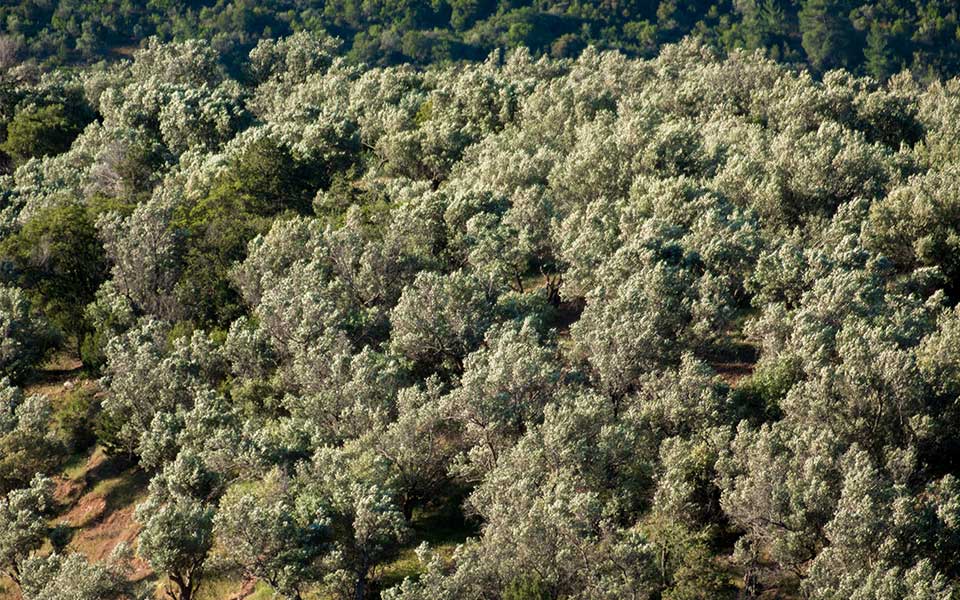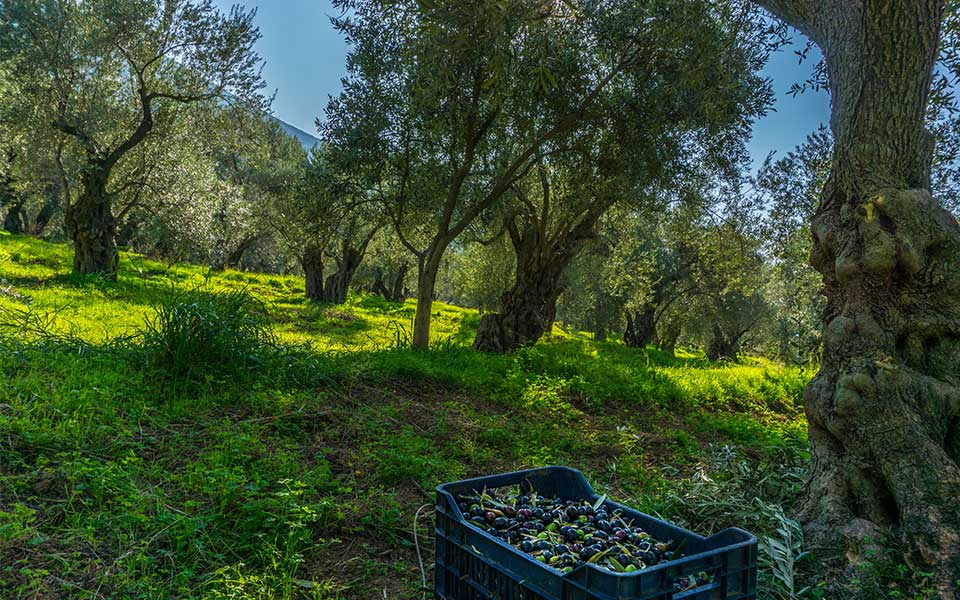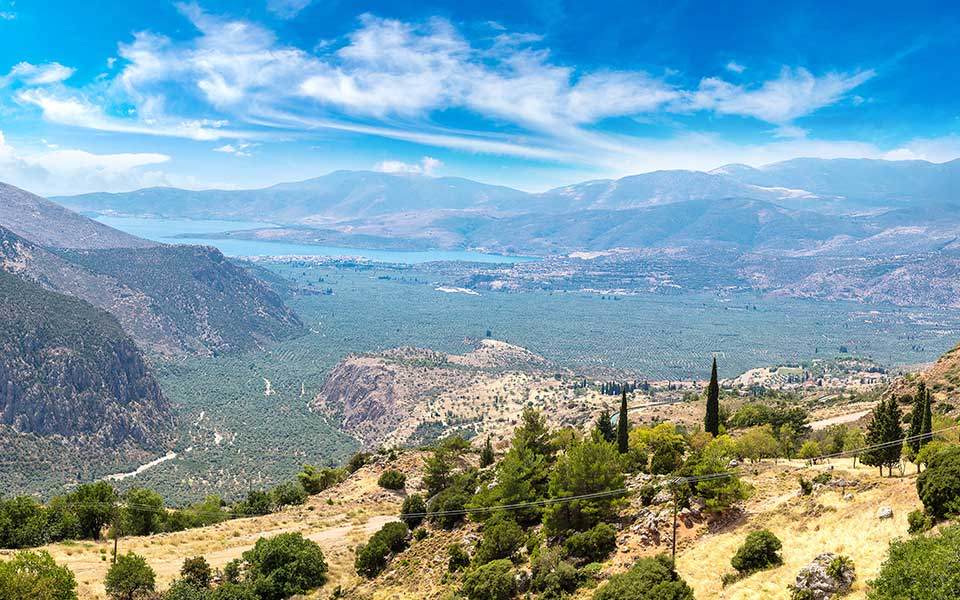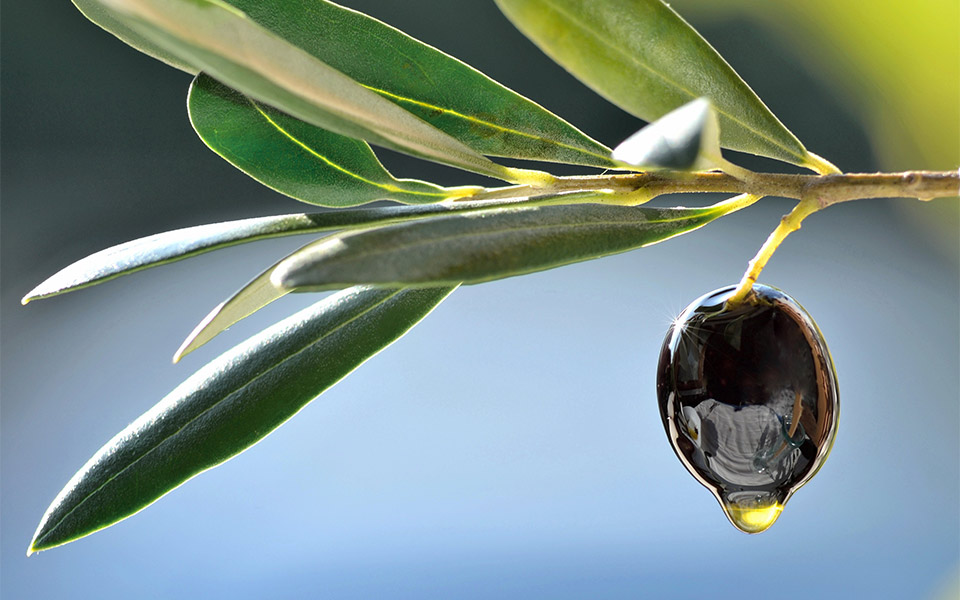Lisa Radinovsky is a writer, editor, and the founder of Greek Liquid Gold: Authentic Extra Virgin Olive Oil (www.greekliquidgold.com), an English language website focused on Greek olive oil featuring news, information, recipes, agritourism suggestions and more.
If we asked the Delphic oracle for advice about combating climate change, would she tell us to eat more olive oil?
This might sound like the puzzling sort of prophecy typical of the priestess of Apollo, but in early December an international gathering of experts, meeting not far from the oracle’s ancient sanctuary, discussed data that support a concrete link between olive oil production and reduced carbon dioxide emissions.
Challenges and opportunities
Opening the 2nd International Yale Symposium on Olive Oil & Health in Delphi, Greek Minister of Rural Development and Food Mavroudis Voridis discussed the challenges posed for the industry by climate change, which he said was partly responsible for this year’s disappointing olive harvest in Crete.
Yet Jaime Lillo, the symposium’s keynote speaker and deputy executive director of the International Olive Council (IOC), argued that even as climate change creates erratic weather patterns – resulting in the most dramatic fluctuations ever seen in the amount of olive oil produced from one year to the next – olive trees can help us avert catastrophe.
For years, he reported, the IOC has been striving “to raise awareness of the positive impact of olive growing.” It is “not only good for your health, but also contributes to the health of the planet” by helping fight climate change, “one of our major threats and our major challenge.”
For millennia, noted Lillo, there has been a “Mediterranean forest” of olive trees which both protect against desertification and clean the atmosphere by removing carbon from it.
The IOC has developed an assessment tool and sponsored extensive research on olive cultivation, olive oil production, and bottling, considering the methods used for approximately 95% of olive oil production in different parts of the world. They discovered that for every liter of virgin olive oil produced, 10.65 kg of carbon dioxide are removed from the atmosphere.
Olive groves are carbon sinks, Lillo explained: one hectare of olive trees can compensate for the carbon footprint of one person, and world olive oil production absorbs the CO2 of a city the size of Hong Kong.

© Shutterstock
From theory to practice
Tassos Kyriakides, a researcher with the Yale School of Public Health and one of the symposium’s co-organizers, said that evidence like that presented by Lillo supports the case for the creation of the Yale Olive Sciences and Health Institute (YOSHI), for the sake of “both public health and planetary health.”
YOSHI’s goal is “to facilitate and coordinate rigorous study, robust research, and creative interdisciplinary education and activities related to the olive tree and its products,” according to Vasilis Vasiliou, a professor at the Yale School of Public Health and co-founder, with Kyriakides, of the institute.
The issue of sustainability is of primary importance for many olive oil producers and researchers, presenting both challenges and opportunities. One key session during the symposium looked at potential uses of olive oil by-products, practical environmental issues encountered by farmers, and innovative, environmentally-friendly ways of dealing with both.

© Shutterstock
For example, Belén Fernández, a researcher at the Institute of Agrifood Research and Technology in Spain, presented various options for disposing of the liquid and solid waste produced when olive oil is made. In addition to composting and biogas production, it is now possible to extract useful compounds such as fatty acids, antioxidants, and enzymes for use in food products, animal feed, cosmetics, and pharmaceuticals. The plan is to introduce some of these ideas to olive farmers in order to make their crop even kinder to the planet.
Francisco Vañó of the Spanish olive oil company Castillo de Canena is already acting on a variety of plans for sustainable farming and oil production, “creating a living forest, a sink of carbon dioxide gases” on his estate.
Involved with many environmentally friendly EU projects, Vañó and his team have created a circular economy that uses reforestation, innovation, technology, precision agriculture, and ecosystem regeneration to encourage biodiversity and combat global warming. Their long list of eco-friendly activities includes producing a natural fertilizer from olive byproducts, monitoring their carbon and water footprints, and utilizing renewable energy.

© Shutterstock
The cost of chemicals
Looking at sustainability from another perspective, Aris Kefalogiannis, founder and former CEO of the GAEA Greek products company, explained how his team introduced innovations to a 4500-year-old product, “the food of the gods,” since he saw olive oil “as a real superfood” and was also concerned about the environment. In 2012, as the IOC was setting up its expert group to calculate the carbon footprint of olive oil more generally, GAEA estimated this footprint for its own Greek extra virgin olive oil.
Why? Because this is “how you solve the environmental problem: with awareness. When you understand, you can do things to improve,” says Kefalogiannis. Taking the footprint even farther than the IOC, all the way to the store shelf (including average transportation estimates), GAEA discovered that pesticides and fertilizers accounted for almost 70% of their olive oil’s carbon footprint. This meant they could substantially reduce that footprint by increasing their reliance on organic production.
Once GAEA learned of the IOC’s findings, they realized their extra virgin olive oil was not only better for the planet than other oils and products like tomatoes and beef, but a truly environmentally friendly food.
Unlike palm oil and other vegetable and seed oils whose production is too often associated with deforestation, olive oil is the juice of a fruit grown in a permanent forest of carbon-sequestering trees. By eating more virgin olive oil, we support the olive forests than can help protect our planet.












